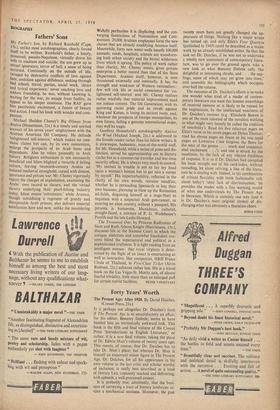Fathers' Sons
My Father's Son, by Richard Rumbold (Cape, 15s.), unlike most autobiographies, clearly forced Itself to be written. Rumbold's father, a lonely, possessed, pseudo-Napoleon, virtually drove his wife to madness and suicide; the son grew up in sexual ignorance, terror of hell, a sense of being accursed. Continually on the outside of life, ravaged by destructive conflicts of love against hate, ambition against diffidence, seeking through bad school, travel, parties, social work, 'direct and lyrical experience,' never reaching love and seldom friendship, he was, without knowing it, waiting for the war, its escape from futility, its appeal to his deeper emotions. The RAF gave him pantheistic excitement, a fusion of beauty and action. I read his book with wonder and com- passion.
Michael Sheldon Cheney's Big Oilman from Arabia (Heinemann, 21s.) is a timely and spirited account of his seven years' employment with the Arabian American Oil Company. He defends enlightened self-interest,' which makes no mes- sianic claims but can, by its own momentum, enlarge the prospects of its Arab hosts and dependants. Also he refers pointedly to Arab history. Religious enthusiasm is not necessarily beneficial and Islam blighted a versatile if failing culture, leaving twentieth-century Arabia an isolated mediaeval stronghold, cursed with disease, Ignorance and private war. Mr. Cheney vigorously rejects the charges of exploitation, examining the Arabs' own record- as slavers, and the virtual slavery underlying their pearl-fishing industry today. Islam means 'submission,' while Aramco, though subsidising a regiment of greedy and disreputable Arab princes, also delivers material satisfaction here and now, unlike the mouldering
Wahabi puritanism it is displacing, and the con- verging fanaticisms of Nationalism and Com- munism. 20,000 Arabian employees form the new classes that are already modifying Aramco itself. Meanwhile, forty new water-wells benefit 100,000 nomads; roads, hospitals, schools are transform- ing both urban society and the brutal wilderness from which it sprang. The policy of work rather than charity, M r. Cheney insists, gives private enterprise a better record than that of the State Department. Aramco itself, however, is now threatened externally and internally. It has the strength and weakness of Western rationalism : few will risk life or social conscience for 'en- lightened self-interest' and Mr. Cheney realises rather wistfully that material improvement need not induce content. The Oil Generation, with its quivering racial pride and its revolt against King and Koran, is losing its ancient roots, and, whatever the prospects of foreign monopolists, its own future, failing a genuine international order, may well be tragic.
Geoffrey Household's autobiography Against the Wind (Michael Joseph, 21s.) is addressed to the fireside reader rather than his fellow writers. It is picaresque, hedonistic, man-of-the-world stuff, for Mr. Household, while a writer of poise and dis- tinction, served his apprenticeship not in literary circles but as a commercial traveller and war-time security officer. He is always very much in control. 'My instinct in trouble is not to lay my head upon a woman's bosom but to get into a corner by myself.' His imperturbability, reflected in the clarity of his own novels, remains steadfast, whether he is persuading Spaniards to buy their own bananas, planning to blow up the Rumanian oil-fields, disguising himself as a stage-Nazi to negotiate with a suspected Arab gun-runner, or entering an alien country without a passport. His persona is humorous, Manichean, cultured, straight-faced, a mixture of P. G. Wodehouse's Psmith and the late Leslie Howard.
The Treasured One, by Princess Rudivoran of Siam and Ruth Adams Knight (Hutchinson, 15s.), discusses life at the Siamese Court in which the antique, elaborate and somewhat fraudulent cus- toms blend the supernatural and political in a sophisticated craftiness. It is light reading from an intelligent woman : that royal virginity is deter- mined by the flight of an insect is entertaining as well as instructive. Her compatriot, HRH Prince Chula of Thailand, in First-Class Ticket (Alvin Redman, 21s.) achieves rather less. His is a travel book on the Las Vegas-St. Moritz axis, of almost fearful triviality, little more than an enlarged puff
for certain tourist facilities. PETER V ANSITTA RT














































 Previous page
Previous page